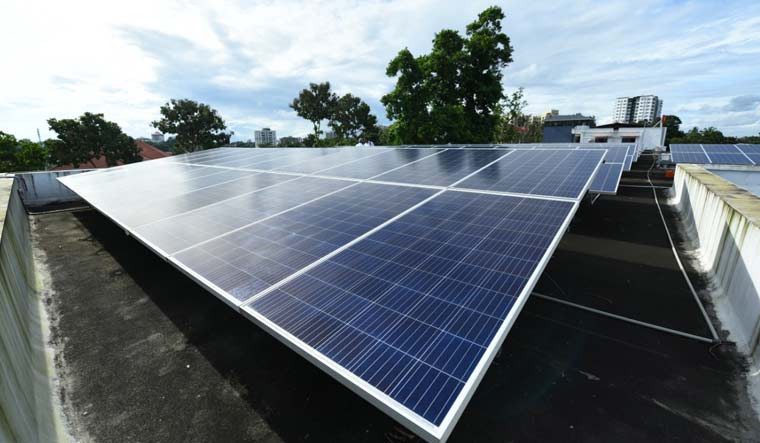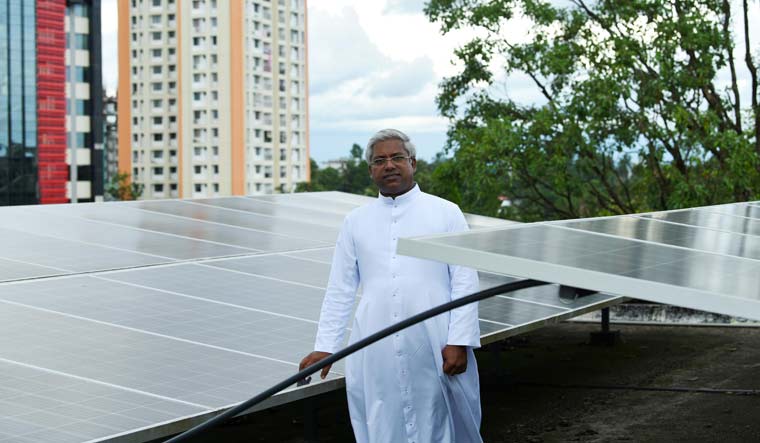Swedish teenager Greta Thunberg was the toast of the global media for much of September as she went about imploring world leaders at the UN to preserve the environment. Whether you agree with her or not, Thunberg’s zeal generated renewed passion for the green agenda among children and youth. But going green can never be only about passion; it needs commitment, prudence and vision.
A college in Kochi, Kerala, has been showing just that by quietly promoting an extensive ‘go green’ agenda for two years on its campus. The Bharat Mata College, located in the IT hub of Kakkanad, had begun a campaign to do away with the use of plastic, minimise carbon emissions and segregate waste two years ago. Bharat Mata College manager Father Jacob Palackappilly proudly declares the institution is a “green campus” with zero use of plastics.
As a culmination of its ‘go green’ initiative, Bharat Mata College inaugurated a solar power facility in September, which produces energy that is surplus to its needs. Bharat Mata College comes under the Roman Catholic Archdiocese of Ernakulam-Angamaly and is affiliated to Mahatma Gandhi University. Founded in 1965, the college currently has approximately 2,600 students.
While other educational institutions in Kerala have taken to using solar power in recent years, Bharat Mata College touts itself as being the first in the state to run completely on solar power. Father Palackappilly explains 248 solar cells have been installed on an area of approximately 8,000sqft. The solar power facility at Bharat Mata College produces 400 units of power daily. Of this, only around 200 units are used for the requirements of the college; the remainder is provided to the Kerala State Electricity Board.
Father Palackappilly reveals that a solar power facility with surplus capacity was installed with ‘future-proofing’ in mind; he notes the facility will be used to power three new academic blocks that are under construction. The three blocks—for commerce, social work and post-graduate courses—are expected to be ready in five years’ time.
Bharat Mata College initially considered installation of solar power three years ago. The college began work on the facility in May, and power generation started in September. Father Palackappilly said Bharat Mata College invested approximately Rs 45 lakh for the solar power facility, installed by a company called SolarEdge. The college spends approximately Rs 9.5 lakh on its electricity requirements annually. “Given that the surplus power generated now is sold to KSEB, Bharat Mata College expects to recoup its investment in around five years’ time,” Palackappilly said.

When asked how Bharat Mata College was different from other educational institutions embracing solar power, Father Palackappilly argues their primary motivation was not the ‘smart economics’ of savings. He notes the solar power facility was just one step in Bharat Mata College’s drive to be an eco-friendly campus.
“We are committed to a zero-waste, zero-plastic campus that is moving to being a completely green campus,” Father Palackappilly noted. He said the college has been sensitising students on its ‘go green’ agenda over the past two years.
“Earlier, the students did not understand what going green meant. But over two years, they have learnt to appreciate its importance,” Father Palackappilly said, adding that students had taken the initiative for installing a vermicompost plant on the campus.
The college has been conducting ‘green audits’—to assess the use, generation and wastage of water, electricity and garbage—on a regular basis. For this too, Father Palackappilly said, the students play a key role; they are tasked with making note of idle usage of fans and lights across the campus as part of the audit. Bharat Mata College conducted its first ‘energy audit’ this year, prior to beginning work on the solar power facility, with an external agency inspecting its electrical systems.
Father Palackappilly bats for solar energy beyond the campus; he argues it would provide a "very reasonable means" to save on electricity consumption for each home. Father Palackappilly warned of the danger of "water bombs", referring to dams generating hydro-electric power. The public perception of dams and the ecological impact they have has been under renewed public scrutiny in Kerala, following the cataclysmic floods of August 2018.



